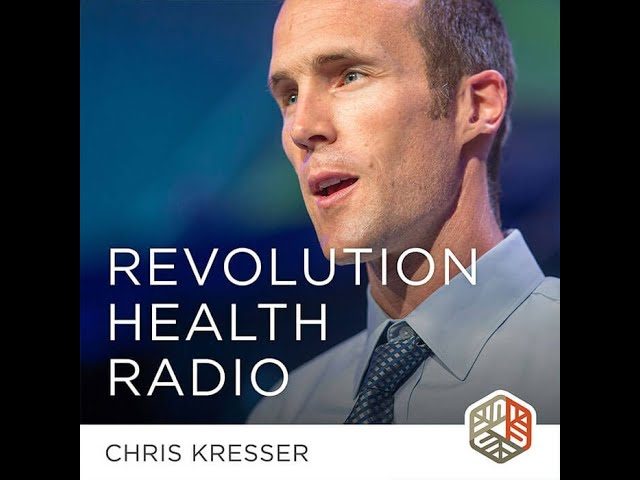
Is IBS an Autoimmune Disease?
Irritable bowel syndrome (IBS) has long been considered a disease of exclusion, a label haphazardly given to patients suffering from abdominal pain, bloating, diarrhea, and constipation but no visible signs of intestinal damage or disease. Fortunately, new research is poised to shift this frustrating paradigm.
The pioneering work of gastroenterologist and researcher Mark Pimentel, MD, indicates that IBS—at least in the case of some patients—may be an autoimmune disease triggered by food poisoning that damages the nerves of the small intestine. Read on to learn about our evolving understanding of IBS and how newly validated biomarkers and medications are paving the way for better diagnosis and treatment of this condition.
If IBS is an autoimmune disease, what does that mean for treatment? Learn more about this new understanding of a long misunderstood disease. #nutrition #chriskresser
IBS: No Longer a Disease of Exclusion
IBS has a reputation for being a “last-ditch” diagnosis, given to patients suffering from gut problems who do not fit the bill for any specific gastrointestinal disease. Due to a lack of validated diagnostic biomarkers, an IBS diagnosis has historically been given only when other gastrointestinal conditions have been ruled out. This process costs patients thousands of dollars in medical expenses while at the same time failing to provide any useful direction regarding treatment.
The problem of how to effectively diagnose and treat IBS has puzzled clinicians for decades. However, thanks to the research of Dr. Mark Pimentel, we may now have some answers.
Dr. Pimentel, an associate professor of medicine at Cedars-Sinai Medical Center, has made it his life’s work to better understand IBS and small intestinal bacterial overgrowth (SIBO). He and I previously discussed SIBO on my podcast, Revolution Health Radio. Recently, I had the honor of hosting Dr. Pimentel again on the show. This time, we discussed his groundbreaking research indicating that diarrhea-predominant IBS (IBS-D) and IBS that is predominantly characterized neither by diarrhea nor constipation, or mixed IBS (IBS-M), are triggered by food poisoning, resulting in the production of antibodies that damage the enteric nervous system and trigger IBS.
Subsets of IBS Are Caused by Food Poisoning and Autoimmunity
But what exactly are vinculin and cytolethal distending toxin? Why does the body create antibodies to these molecules, and how do the antibodies contribute to IBS?
Cytolethal Distending Toxin and Vinculin
Cytolethal distending toxin (Cdt) is a toxin produced by bacteria implicated in food poisoning, including Campylobacter jejuni, E. coli, Shigella, and Salmonella. Cdt causes cell cycle arrest and apoptosis of intestinal cells (hence the name “cytolethal distending toxin”). (2, 3) It is recognized as foreign by the immune system, resulting in the production of anti-Cdt antibodies.
Vinculin, on the other hand, is a self-protein. It is a membrane cytoskeletal protein that resides within the myenteric ganglia and interstitial cells of Cajal, specialized nerve cells in the intestinal epithelium that regulate gut motility. While the body is normally tolerant of vinculin, anti-Cdt antibodies produced during food poisoning cross-react with vinculin. This cross-reactivity causes the body to mistakenly recognize vinculin as foreign, launching an immune response that culminates in the production of anti-vinculin antibodies.
The sequence of events leading to autoimmune IBS pathology looks like this:
- During an episode of food poisoning, pathogens such as C. jejuni release Cdt into the gut lumen.
- The immune system recognizes Cdt as foreign and creates antibodies to it. Anti-Cdt antibodies proliferate.
- Anti-Cdt antibodies cross-react with vinculin that is present in the gut, leading to the production of anti-vinculin antibodies. (4)
- Anti-vinculin antibodies destroy vinculin, disrupting epithelial tight junction proteins and damaging nerve cells. This causes leaky gut and dysmotility. Faulty intestinal motility facilitates small intestinal bacterial overgrowth (SIBO) and triggers IBS symptoms. (5)
- Anti-Cdt antibodies also react with beta-amyloid, zonulin, acetylcholine receptor, somatotropin, and presenilin, suggesting that IBS may also play a role in autoimmunity beyond the gut. (6)
People with IBS-D and IBS-M have significantly higher levels of anti-Cdt and anti-vinculin antibodies compared to those with celiac disease, inflammatory bowel disease, and healthy individuals; since these antibodies distinguish IBS-D and IBS-M from other gut pathologies, they are now considered distinct biomarkers for IBS. (7) However, the antibodies do not appear to be significantly elevated in people with IBS-C (constipation-predominant IBS), and therefore cannot be used to diagnose that particular form of IBS.
Testing for Antibodies in IBS
Dr. Pimentel has developed an innovative test, based on his research, that detects anti-Cdt and anti-vinculin antibodies. The test, IBS-Smart, is 90 percent predictive of IBS-D and IBS-M. (8) Importantly, Dr. Pimentel notes that one does not need to have experienced a severe, acute bout of diarrhea to have IBS caused by food poisoning; in fact, he notes that most food poisonings are “marginally eventful.”
IBS-Smart is intended to be used in conjunction with breath testing, commonly used to explore the pathophysiology of SIBO. An IBS-Smart test that is positive for antibodies tells you the underlying cause of your IBS: food poisoning. It predicts the likelihood that prokinetics (drugs that boost motility) will need to be a part of your treatment protocol and possibly taken indefinitely; the higher the antibodies, the more likely prokinetics will be necessary. It also provides a prognosis of success of therapy; the higher your anti-vinculin antibodies, the more likely you are to relapse and the higher your risk of contracting food poisoning again down the road.
The breath test, on the other hand, tells your doctor how to approach your treatment. The antibiotic rifaximin is indicated in the case of a high-hydrogen breath test, while elevated methane suggests a need for rifaximin plus either neomycin or metronidazole. (9, 10)
Three Treatment Options for IBS
1. Antibiotics
Rifaximin is a non-systemic antibiotic, meaning it acts within the intestinal lumen without reaching systemic circulation. Multiple randomized controlled trials have demonstrated its efficacy in the treatment of IBS-D and IBS-M. (11)
A high-methane breath test, on the other hand, points to a need for rifaximin plus either neomycin or metronidazole. Elevated methane is typically more challenging to treat than elevated hydrogen due to the hardiness of methane-producing archaea; methane-predominant SIBO and IBS thus have a high recurrence rate. However, such cases of IBS are not caused by autoimmunity, according to Dr. Pimentel’s research.
2. Prokinetics
Prokinetics are drugs that enhance gastrointestinal motility by increasing the strength and/or frequency of muscular contractions in the gut, referred to as peristalsis. Peristalsis is critical for managing bacterial levels in the gut; insufficient peristalsis significantly increases the risk of bacterial overgrowth.
High anti-vinculin antibodies may indicate a need for prokinetics after antibiotic therapy. By increasing peristalsis, prokinetics inhibit bacterial overgrowth, the underlying cause of gut dysfunction in up to 80 percent of IBS patients. (12) If anti-vinculin antibodies are extremely high, your doctor may want to incorporate a prokinetic into your treatment protocol simultaneously with antibiotic treatment.
Which prokinetic drugs are useful for IBS? Erythromycin is used as an antibiotic at high doses, but at low doses, it acts instead as a prokinetic agent. (13) At the low dose used for prokinetic effects, erythromycin does not appear to have any adverse impact on the gut microbiota.
Prucalopride (Motegrity) and tegaserod (Zelnorm) are two more potential prokinetic options. Both drugs are serotonin agonists, meaning they bind to and activate serotonin receptors in the gut. Activation of serotonin receptors increases gut motility. While these drugs show promise, more research on their long-term safety is needed. Recent studies suggest that previous concerns about Zelnorm may have been unfounded. Dr. Pimentel and I discussed this in my recent podcast, and I’ll be following the research in this area with interest.
3. Lovastatin
Emerging research suggests that an unlikely drug, lovastatin, may be particularly beneficial in the treatment of constipation-predominant IBS, or IBS-C, a non-autoimmune form of IBS associated with high intestinal methane levels. Lovastatin may sound familiar—it was the first member of the statin family of drugs to be marketed, way back in 1987. A new formulation of this drug, called SYN-010, has been optimized to help patients with IBS-C. SYN-010, which is still in trials and has not yet been approved by the FDA, is not absorbed into systemic circulation and therefore does not impact cholesterol or cause the side effects normally associated with statins. Instead, SYN-010 acts locally in the gut, blocking an enzyme in Methanobrevibacter smithii that leads to methane gas production; the resulting drop in intestinal methane improves GI symptoms in IBS-C patients. (14, 15)
Additional Developments in IBS
In addition to our newfound understanding of IBS-D and IBS-M as autoimmune disorders, several other discoveries have recently emerged in the realm of IBS.
- Surprisingly, PPIs may not be harmful to the gut: In our interview, Dr. Pimentel cited research suggesting that proton-pump inhibitors (PPIs) don’t adversely affect the gut microbiota. However, given the vast body of evidence linking PPIs with changes in the gut microbiota and other health issues, I will be reviewing these new findings with a critical eye.
- Small intestinal fungal overgrowth (SIFO) is involved in IBS: Bacteria are not the only “bad guys” in IBS; research indicates that fungal overgrowth also plays a role. (16) Currently, there is no commercial testing available specifically for detecting SIFO, though gut microbiota tests such as the GI-MAP may be useful for identifying dysbiotic gut fungi.
- Proteobacteria trigger hydrogen-predominant IBS: Proteobacteria comprise a large phylum of gram-negative bacteria, including Escherichia, Helicobacter, Legionellales, Salmonella, Vibrio, and Yersinia. Studies suggest that these bacteria play a pivotal role, specifically in hydrogen-predominant IBS. (17)
- Lower diversity of gut bacteria is associated with IBS: While bacterial overgrowth is a common cause of IBS, research indicates that a lower overall diversity of gut bacteria also plays a role. (18)
Now I’d like to hear from you. Do you suspect food poisoning as a cause of your IBS? Have you tried any of the treatment strategies outlined here? Let me know in the comments below.






